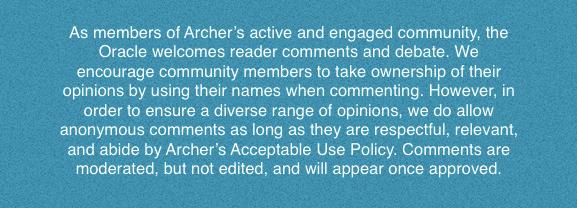Editorial: Anonymous Comments Encourage Dialogue

Last semester, the most popular Oracle article was an Op-Ed entitled “Don’t Fear the F-Word: Archer’s Feminist Legacy.”
The editorial argued that those who attend Archer are, in fact, feminists, but because society demonizes feminism, girls may be hesitant to adopt this label. Many commenters agreed, but one anonymous respondent did not. This person wrote a lengthy comment explaining their reasoning for disagreeing with the Op-Ed, including the statement, “Going to a school doesn’t necessarily predict what you believe.”
The anonymous comment was respectful in stance and content, but it expressed an opinion that differed from mainstream Archer dogma. Rather than getting defensive, however, students who disagreed with the anonymous comment responded respectfully.
One commenter was thankful for the differing opinion, saying that “it’s easy for discussions to become agreeable, one-sided celebrations of the same ideas. Everyone’s happy because everything they say is applauded.”
This comment sparked a high quality debate and raised questions about what the Oracle’s comment policy should be, something the class had never discussed.
According to Archer’s Student Handbook, “Anonymous postings on message board sites that violate school rules and policies will be investigated. Such postings undermine the atmosphere of trust that is an essential core value of the school.” Because of this rule, we had never considered allowing anonymous comments, but this experience made us rethink our position.
We conducted surveys and rich in-class discussions. The majority of the Oracle staff, 62.5 percent, felt that these comments should be allowed. “Disallowing anonymous opinions would serve only to discourage kids from sharing controversial beliefs,” said one staff respondent.
However, those opposed to allowing anonymous comments argued that “people should feel confident enough in what they have to say [and] take ownership of their comments.” The Archer community promotes an accepting and inclusive community, they argued, and readers should feel safe sharing unpopular opinions.
Such a division in opinion demanded a comment policy that outlined the expectations for our readers.
The staff next consulted the Honor Education Council, who helped raise important questions about our comment policy and its correlation to Archer’s Acceptable Use Policy. But the results of the conversation were inconclusive — more discussion was needed to arrive at a clear decision.
Ultimately, we looked at the Oracle’s Mission Statement for guidance. It states, in part: “The Oracle staff is committed to fostering critical thinking in our reporting as well as providing a venue for creative expression.”
For those with unpopular opinions, anonymous comments allow readers to express their voice. The comment posted in “Don’t Fear the F-Word” opposed the popular viewpoints of Archer students, and without this contribution, there would not have been such an intriguing debate. We decided that prohibiting anonymity would contradict our mission.
However, we also decided on some limitations to this freedom. Although “we strive to strengthen student voices,” we are intolerant of comments that are harmful, inappropriate in content of language, or those that personally attack an individual or group. The faculty advisor will not post comments of this nature and will contact the respondent personally. We strive for careful moderation that sparks debate but does not interfere with content.
While we do allow the option of anonymity, we hope that our readers feel safe enough to take ownership and share their authentic voices openly.
The Oracle thanks our dedicated readers and commenters. We appreciate your contributions and your understanding of our purpose and mission.
Featured Image: The Oracle’s official comment policy.
The Oracle's student editorial board, led by the Editor-in-Chief, makes all decisions that pertain directly to the Oracle and has final say over all content....








